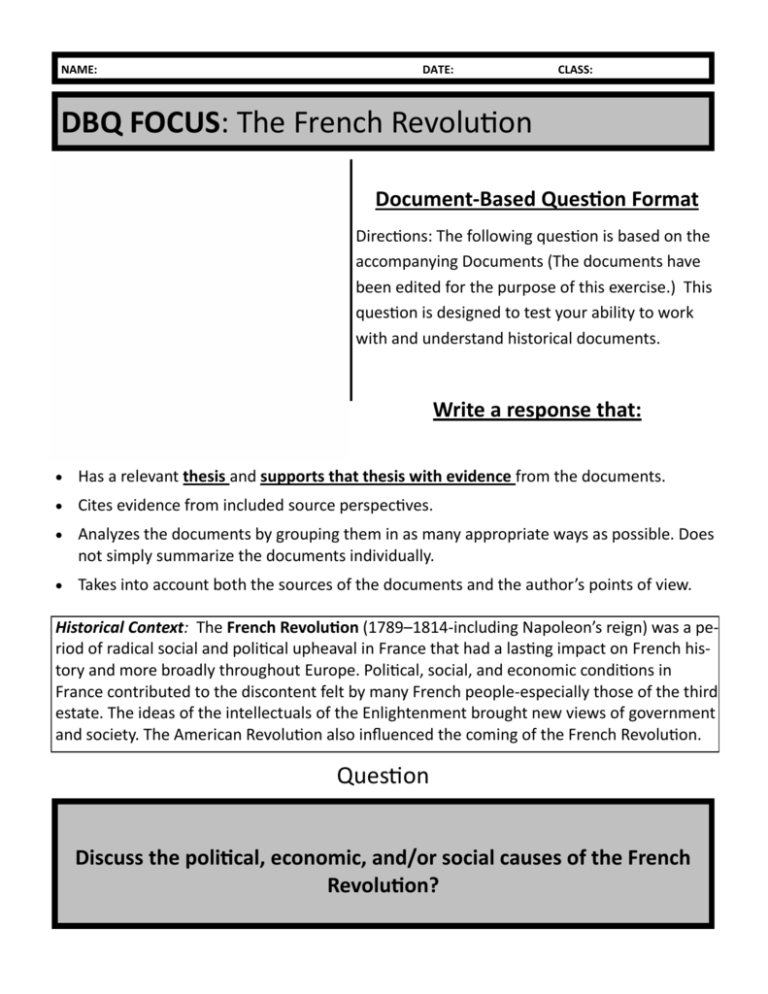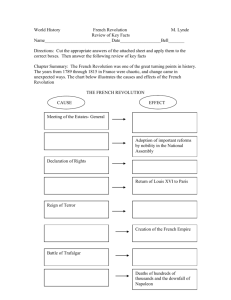DBQ FOCUS: The French Revolution
advertisement

NAME: DATE: CLASS: DBQ FOCUS: The French Revolution Document-Based Question Format Directions: The following question is based on the accompanying Documents (The documents have been edited for the purpose of this exercise.) This question is designed to test your ability to work with and understand historical documents. Write a response that: Has a relevant thesis and supports that thesis with evidence from the documents. Cites evidence from included source perspectives. Analyzes the documents by grouping them in as many appropriate ways as possible. Does not simply summarize the documents individually. Takes into account both the sources of the documents and the author’s points of view. Historical Context: The French Revolution (1789–1814-including Napoleon’s reign) was a period of radical social and political upheaval in France that had a lasting impact on French history and more broadly throughout Europe. Political, social, and economic conditions in France contributed to the discontent felt by many French people-especially those of the third estate. The ideas of the intellectuals of the Enlightenment brought new views of government and society. The American Revolution also influenced the coming of the French Revolution. Question Discuss the political, economic, and/or social causes of the French Revolution? Document 1 Source: This excerpt is adapted from Travels in France by Arthur Young, who traveled through France from 1787 to 1789. Student Analysis In the south of France there is a taille [tax on the land and its produce]. There is an injustice in levying the amount each person must pay. Lands held by the nobility are taxed very little. Lands held by commoners are taxed heavily… September 5, 1788: The poor people seem very poor indeed. The children are terribly ragged. June 10, 1789: The lack of bread is terrible. Stories arrive every moment from the provinces of riots and disturbances, and calling in the military, to preserve the peace of the markets….The price of bread has risen above people’s ability to pay. This causes great misery. July 1789: ….I was joined by a poor woman who complained of the hard times. “The tailles and feudal dues [rents owed the lords] are crushing us,” she said. Document 2 Source: These excerpts from cahiers (lists of grievances about the king, taxing, and voting in the Estates General) brought to the Estates General. Student Analysis That the king be forced to reform the abuses and tyranny of letter de cachet. That every tax…. Be granted [by the Estates General] only for a limited time. That the taille [a tax on land] be borne equally by all classes…. The meetings of the Estates General…. Shall be scheduled for definite times…. In order to assure the third estate the influence it deserves because of its numbers… its votes in the assembly should be taken by head… Document 3 Source: In The French Revolution, historian Albert Mathiez claims that leadership fell to the middle class with their knowledge of the ideas of the Enlightenment. Student Analysis The Revolution had been accomplished in the minds of men long before it was translated into fact…. The middle class… was sensitive to their inferior legal position. The Revolution came from them-the middle class. The working classes were incapable of starting or controlling the Revolution. They were just beginning to learn to read. Document 4 Source: Comte D’Antraigues as quoted in an excerpt form Citizens: A Chronicle of the French Revolution The condition of France alone did not bring about the overthrow of the monarchy… for the suffering of the people was not greater than they had been before. The ideas of the philosophs were not directly responsible for the outbreak…[but] the spark that changed thought into action was supplied by the Declaration of American Independence… The American example caused the Revolution to break out… Student Analysis Document 5 Source: Excerpt from the Declaration of the Rights of Man and Citizen (1789). Student Analysis 1. Men are born and remain free and equal in rights; social distinctions can be established only for the common benefit. 2. The aim of every political association is the conservation of the imprescriptible rights of man; these rights are liberty, property, security, and resistance to oppression…. 4. Liberty consists in being able to do anything that does not harm another person.. 10. No one may be disturbed because of his opinions, even religious, provided that their public demonstration does not disturb the public order established by law. 11. The free communication of thoughts and opinions is one of the most precious rights of man: every citizen can therefore freely speak, write, print… 16. Any society in which guarantees of rights are not assured nor the separation of powers determined has no constitution. Document 6 Source: Jackson J. Spielvogel, World History, Glencoe/McGraw-Hill, 2003 Student Analysis Document 7 Source: John Hall Stewart, ed., A Documentary Survey of the French Revolution, Macmillan . . . By 1799, however, Frenchmen had had the experience of enjoying, at least in theory, freedom of speech and freedom of the press. Education had been reorganized along the lines which it still follows in most modern states—free, compulsory, universal, and secular. The Revolution had given rise to an extensive, if not always great, periodical press. Lack of opportunities had yielded to the “careers open to talents” already mentioned, and such talents were encouraged and brought to fruition through public prizes, state patronage, and similar devices. Moreover, while there had been few museums and libraries prior to 1789, the revolutionaries established many more, planned still additional ones, and endeavored to integrate them with the educational system. . . . Student Analysis Document 8 Source: Robert B. Holtman, The Napoleonic Revolution, J.B. Lippincott Company, 1967 Student Analysis . . . The lasting quality of Napoleon’s reforms outside France was in direct ratio to the length of time French control had been in effect and to the weakness of the local governments. In the areas annexed before 1804, the Revolutionary changes were put into effect as a whole. Italy was more profoundly transformed than any other part of Europe. The stronger the local governments were, the more able they were to overthrow Napoleonic institutions after his military defeat. But only rarely did the reaction upset the civil principles which to Napoleon were so important. Even in Naples King Ferdinand did not abolish the Civil Code or re-establish feudal rights when he returned. All the reactionary forces of Europe combined were not strong enough to restore things as they had been before the outbreak of the French Revolution. They could not, in particular, undo the many-faceted social change that had been set in motion. . . . Document 9 Source: Thomas E. Kaiser, University of Arkansas, encarta.msn.com/encyclopedia Student Analysis . . . However, the majority of Europeans and non-Europeans came to see the Revolution as much more than a bloody tragedy. These people were more impressed by what the Revolution accomplished than by what it failed to do. They recalled the Revolution’s abolition of serfdom, slavery, inherited privilege, and judicial torture; its experiments with democracy; and its opening of opportunities to those who, for reasons of social status or religion, had been traditionally excluded. One of the most important contributions of the French Revolution was to make revolution part of the world’s political tradition. The French Revolution continued to provide instruction for revolutionaries in the 19th and 20th centuries, as peoples in Europe and around the world sought to realize their different versions of freedom. Karl Marx would, at least at the outset, pattern his notion of a proletarian revolution on the French Revolution of 1789. And 200 years later Chinese students, who weeks before had fought their government in Tiananmen Square, confirmed the contemporary relevance of the French Revolution when they led the revolutionary bicentennial parade in Paris on July 14, 1989. . . . Document 10 Source: Treatment of the Third Estate political cartoon. Circa 1780s. Student Analysis Comments:






